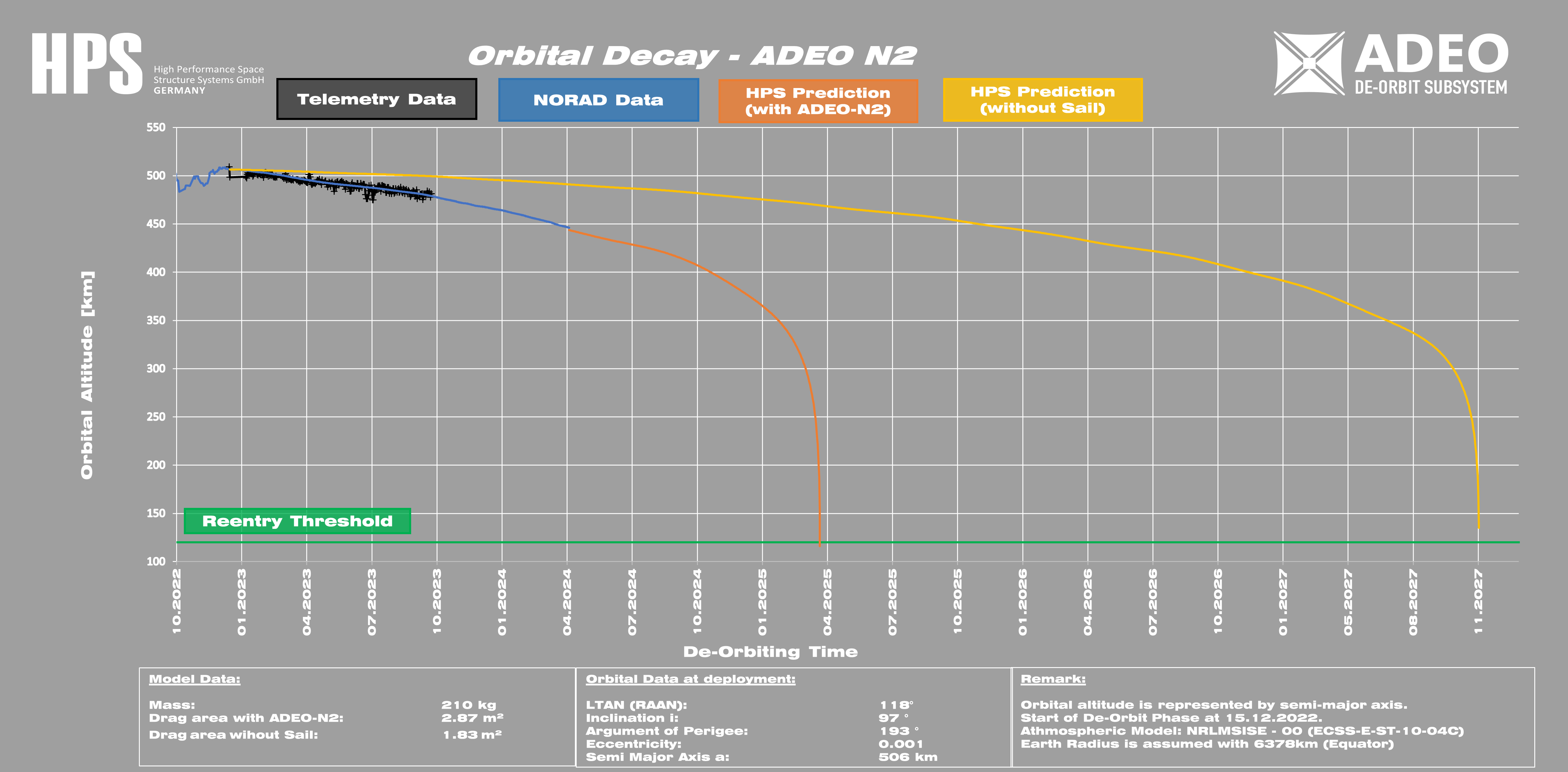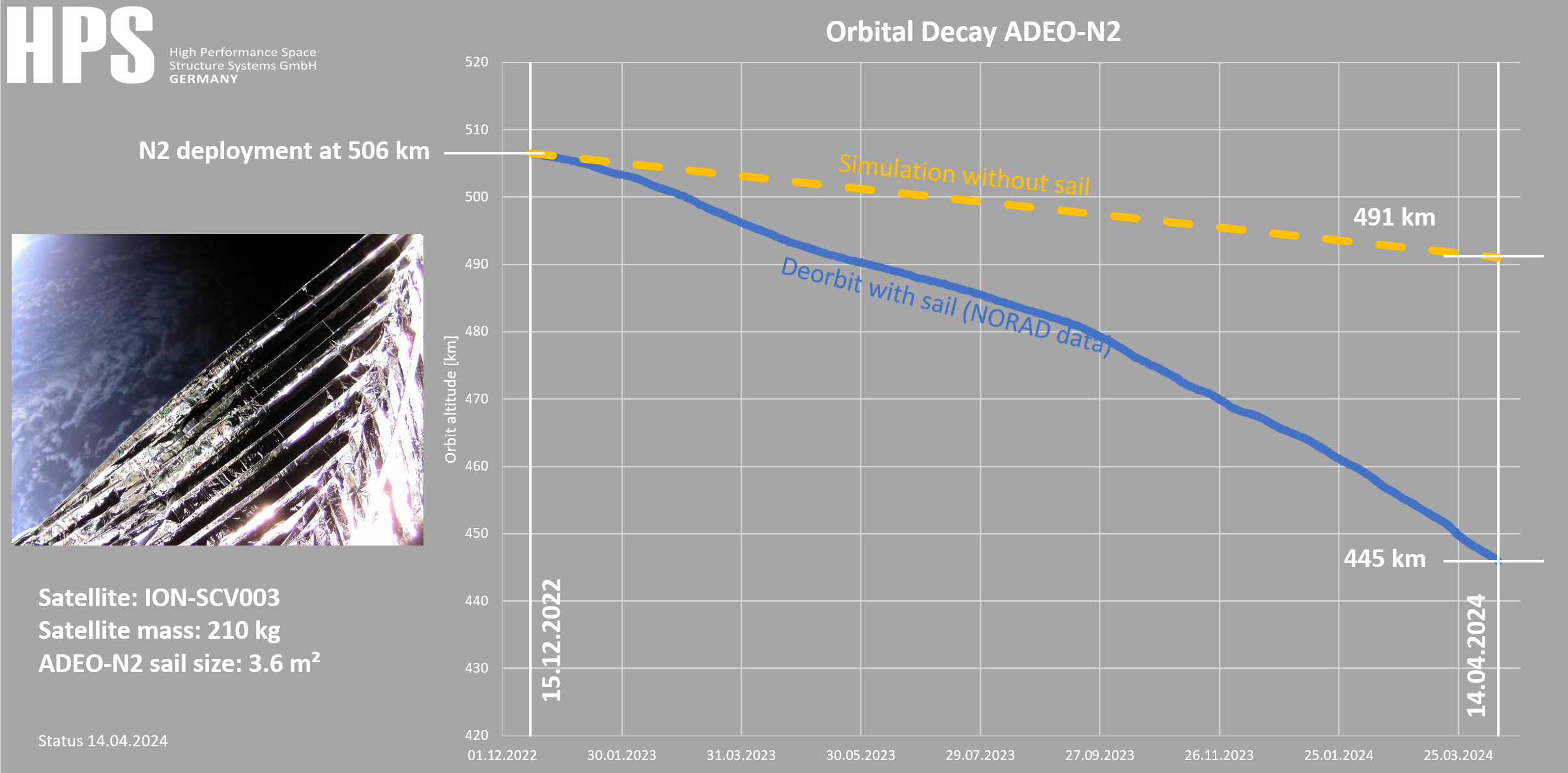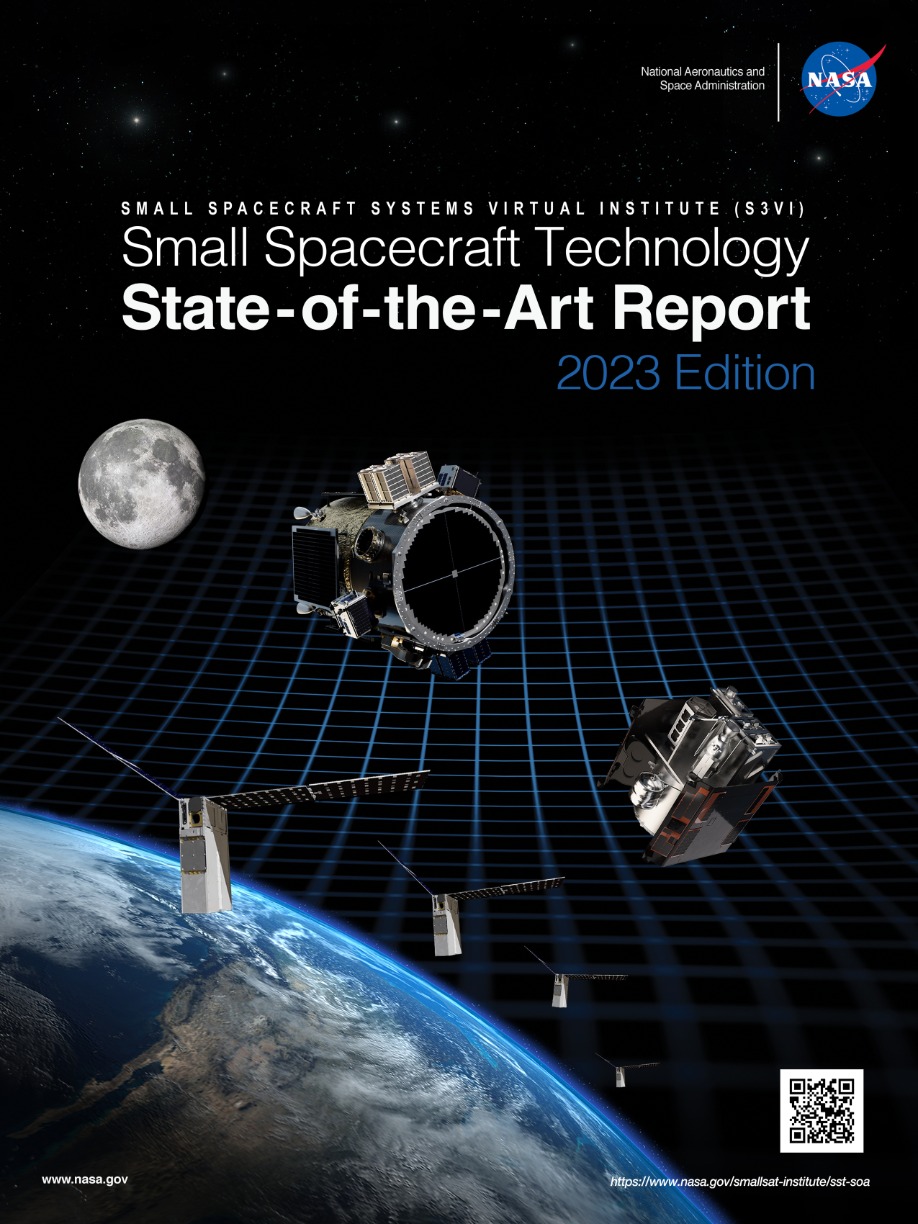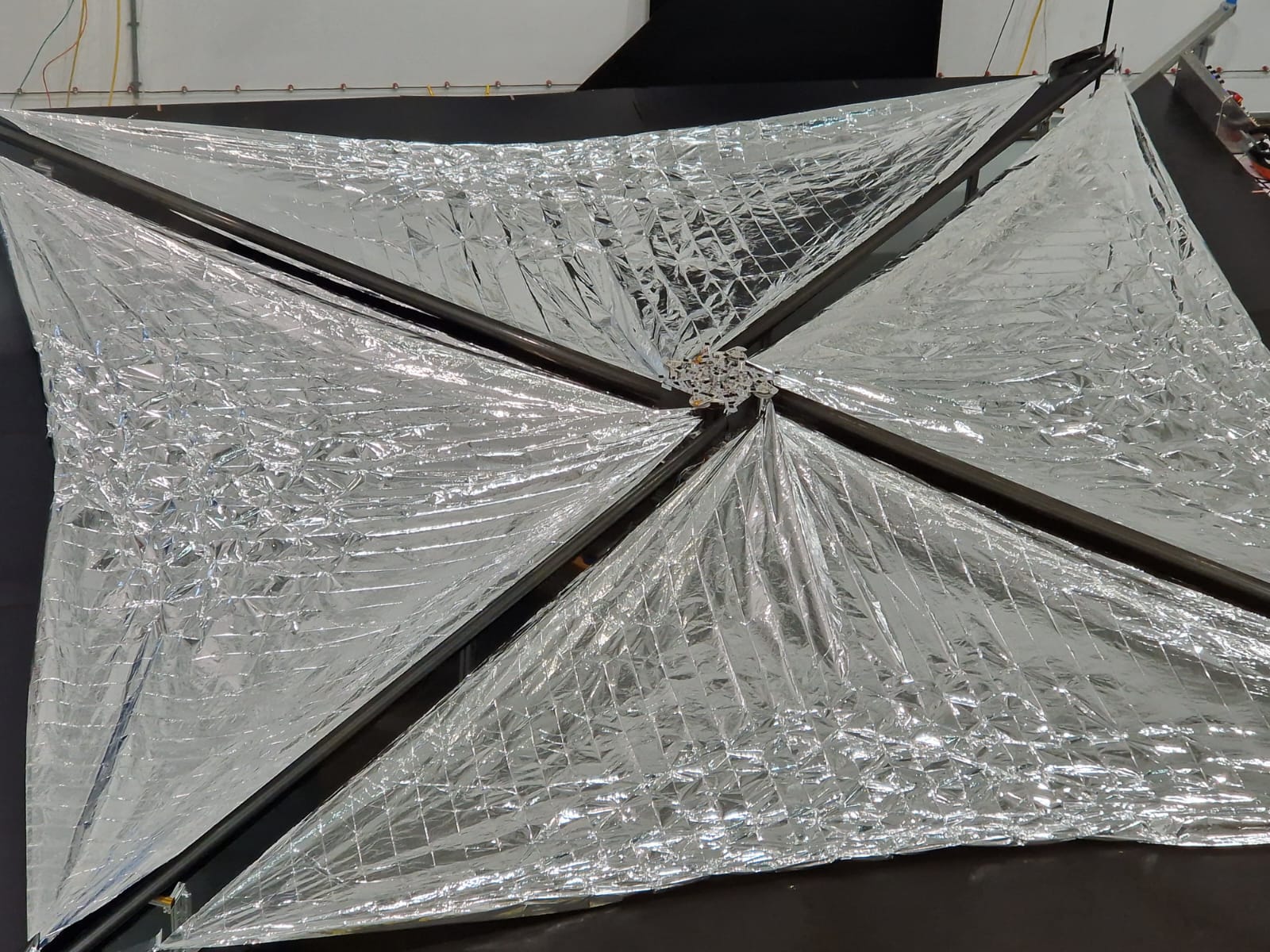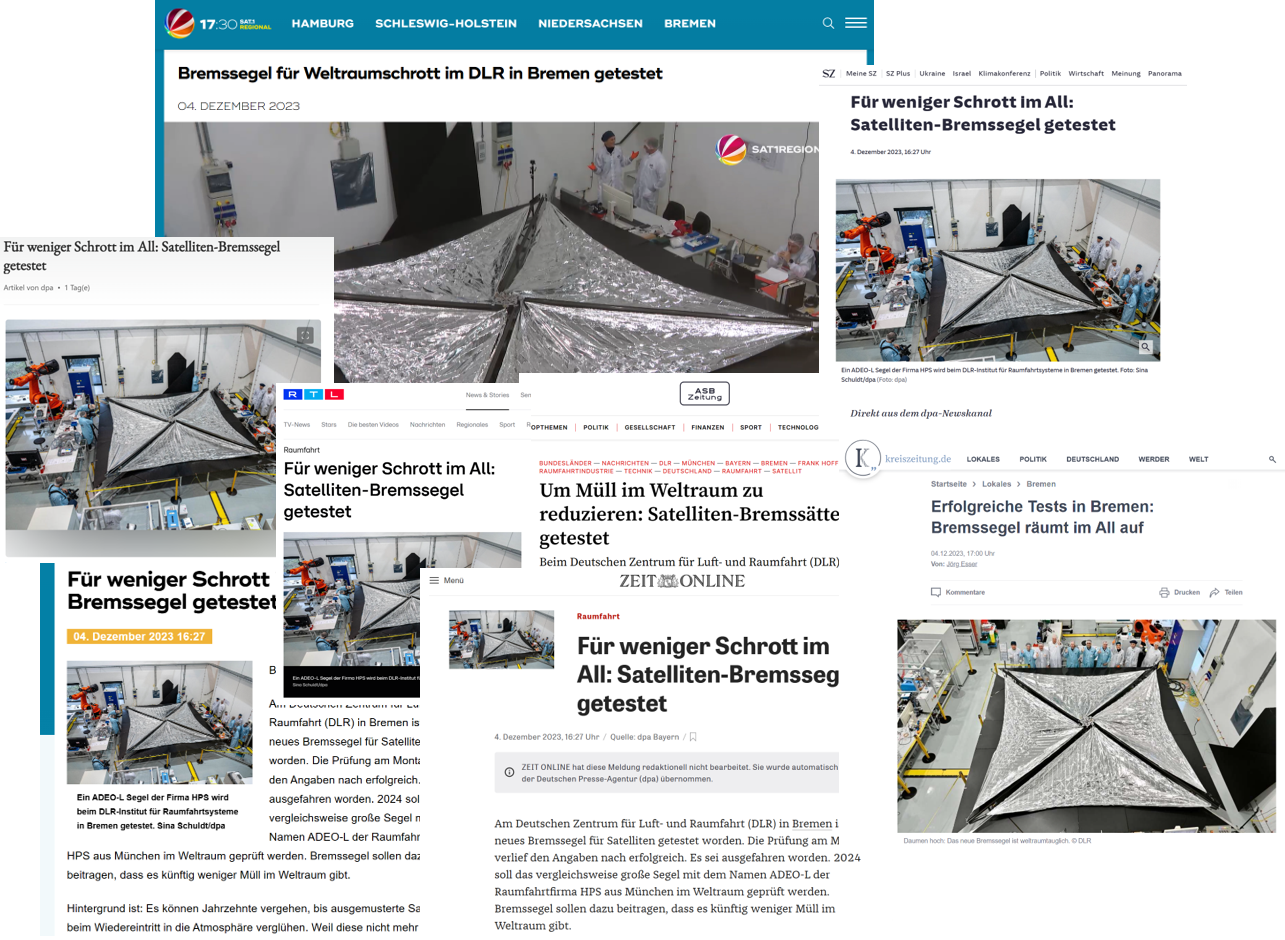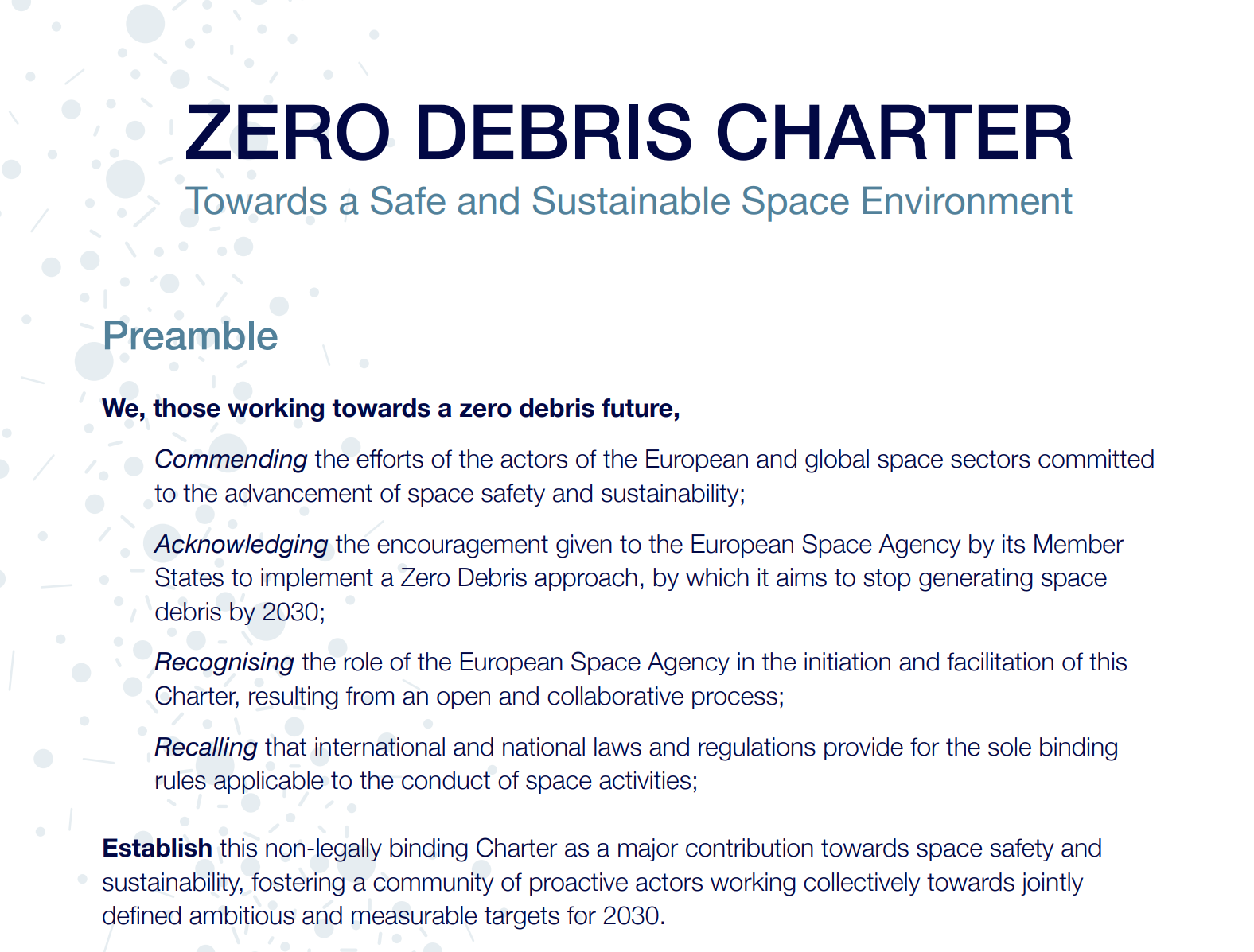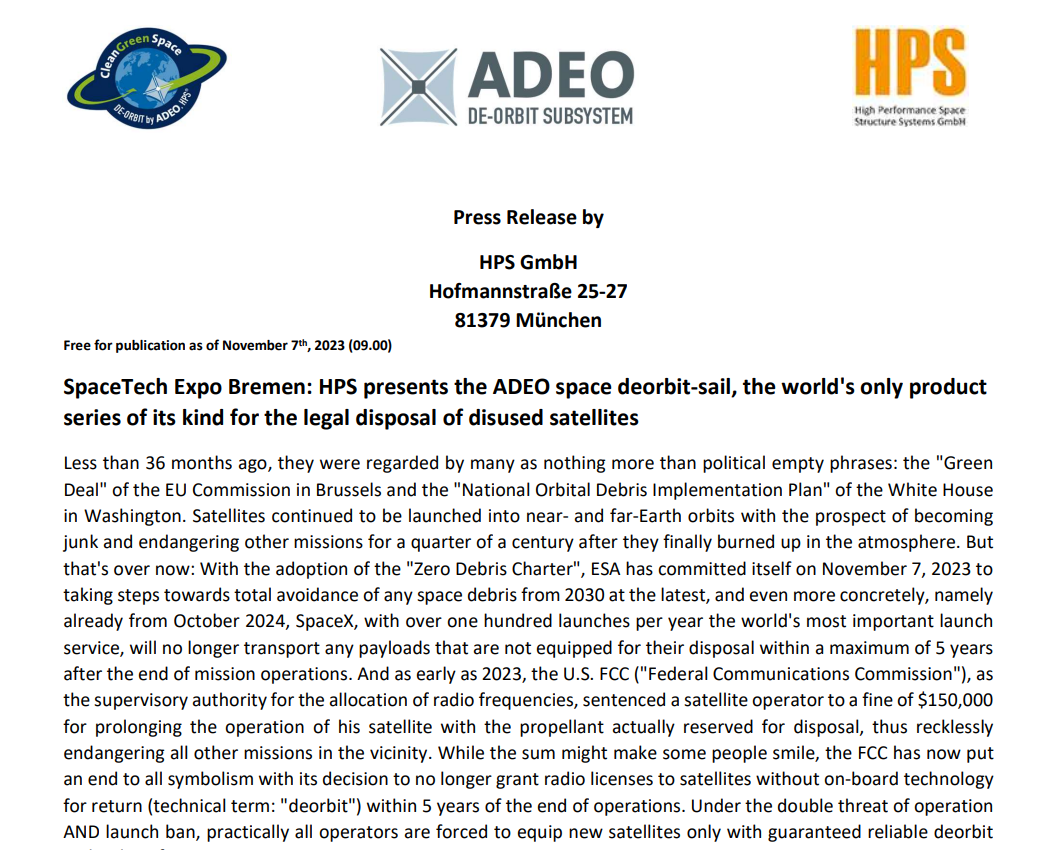May 2024
Update on ADEO´s Performance
After 487 days of approachflight towards Earth, ADEO-N2 on the ION SCV 3 test satellite continues to sail on a record course without even a scratch: the current position has been reached in a threefold shorter time of the ADEO deorbit compared to the classic missions, whose data are subject to the prediction algorithms.
Expected touchdown at the edge of the Earth’s atmosphere: April 2025.
This is reported by the two mission managers, D-Orbit, Rome (satellite) and HPS, Munich (brake sail).
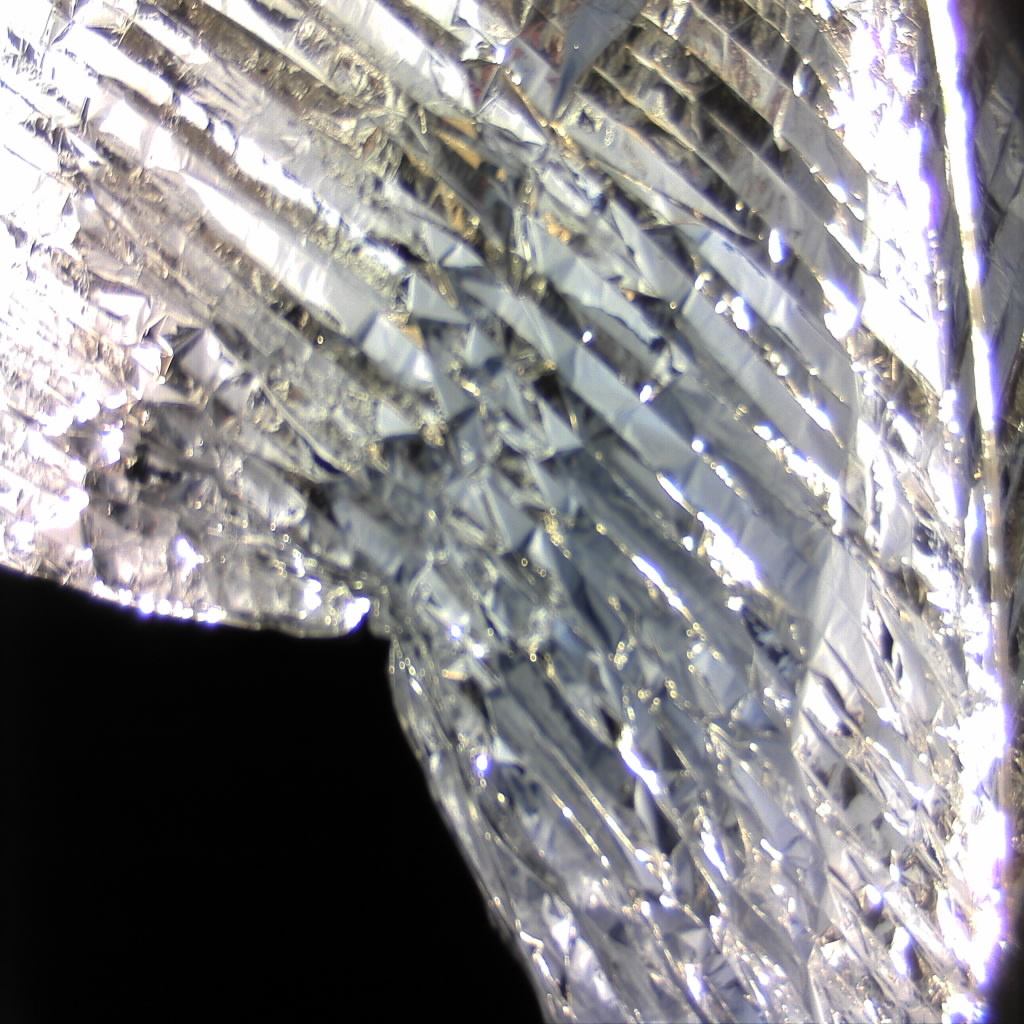
February 2024
HPS with ADEO in top position in NASA’s technology report
Since its inception, the U.S. space agency NASA has been the primary driver of progress in aerospace technology. NASA’s Scientific and Technical Information (STI) program plays a key role in ensuring that NASA maintains this important role. Its Technical Reports Server contains one of the largest collections of aerospace science STI in the world, including “Technical Publications” on critical research and achievements of lasting value.
Focus on deorbit technologies
The aim of the latest publication, published in February 2024, on groundbreaking technologies, particularly in the field of small satellites, is, among other things, to present the world’s leading deorbit technologies, which can be used to technically implement the new regulation on the disposal of LEO satellites, which has been sharply limited from 25 to 5 years in both the USA and Europe. In its evaluation criteria for technologies, NASA is primarily guided by the TRL standard of the respective products and also pays great attention to the scalability achieved.
ADEO has it all: top values up to TRL-9, scalability and flight successes
According to NASA, the deployable brake sail system ADEO from HPS occupies the leading position on the global market in the category of passive deorbit systems. This is because ADEO not only offers technological maturity up to the peak value of TRL-9, but also a successful flight heritage and is also prepared for equipping various small satellite formats thanks to the HPS series production of an entire product family. This broad protection of HPS’s leading position with ADEO has been widely recognized by NASA – despite the fact that it is a competitor with several projects in this field:
“The Drag Augmentation Deorbiting System (ADEO) is a drag sail developed by the German company High Performance Space Structure Systems (HPS). The sail is scalable and HPS has already launched a number of missions with different configurations up to TRL 9. The ADEO-N series is tailored for small satellite missions of 20-250 kg, while the ADEO-M and ADEO-L series are designed for larger missions of 100-700 kg and 500-1500 kg respectively. The ADEO-N series corresponds to a sail size of 5±2 m2, while ADEO-M covers areas of 15 ± 5 m2. There are also smaller versions, especially for picosatellites (ADEO-P) and CubeSats (ADEO-C), and the possibility to configure the sail size according to customer requirements. Various missions have already tested the ADEO-N product family. The NABEO-1 was launched on a Rocket Lab Electron rocket kick stage in 2018. The sail was deployed just 90 minutes after launch. There was a problem measuring whether the drag sail was initially deployed, but visual ground observations confirmed successful deployment and performance. At the end of December 2022, the ADEO-N2 sail was launched into space by the ION-2 spacecraft carrier of the Italian launch service provider D-Orbit. The successful deployment was recorded by the ION carrier’s on-board camera.”
ADEO – Deorbit technology as a prerequisite for launch authorization
With this presentation in one of the most important technology documentations of the US space agency NASA, HPS with ADEO becomes a highly visible beacon in the worldwide field of passive deorbit systems for all satellites that have to comply with the new 5-year deorbit requirement in order to be approved for launch by American or European launchers
ADEO L1 “ready for lift-off”: World’s largest operational brake sail for the disposal of space debris successfully tested
Dezember 2023
ADEO L1 “ready for lift-off”: World’s largest operational brake sail for the disposal of space debris successfully tested
HPS completes the ADEO sail fleet with its first largest version under the version named L1. Its 25 square meters of sail area unfolded successfully deployed on Monday, 4th of December 2023 in a final ground test after a complete completed PFM qualification campaign. This included vibration tests in all axes as well as tests under thermal vacuum, including hot and cold firing tests (tests to verify the deployment release mechanisms under extreme temperatures). The tests were carried out under responsibility of HPS Munich at the facilities of the DLR Institute of Space Systems in Bremen – a prime example of cooperation between industry and research & development. This final and most important test enjoyed great interest from the media (including SAT1, RTL, NTV, DPA) covering the 20-minute deflation process and interviewing the enthusiastic project team of HPS and DLR. Links to the articles and television videos can be found HERE.
This test is also a success of ESA’s GSTP program, which significantly supported the development of ADEO-L1 financially and technically. Technology programs in general are essential for independent SMEs in the space industry and their products on the way to market readiness and worldwide series sales.
The ADEO brake sails deploy after the end of the satellite’s mission and brace themselves against the resistance of the atmosphere that still prevails in orbits up to an altitude of just under one thousand kilometers. This deployment immediately leads to a drastic reduction of the speed of the satellite and the entire package sets off on its accelerated descent towards the earth’s atmosphere, where it then burns up in the frictional heat of up to two thousand degrees Celsius. The entire return process takes even significantly less time than the latest guidelines prescribe. Until recently, the process could take up to twenty-five years, while it must now be completed within five years. And, to ensure that operators follow the rules, launch service providers such as SpaceX no longer even take satellites into space if they are not equipped with the appropriate return technology from the outset.
The Munich-based space-tech company HPS had this development in mind more than ten years ago, when no one else was really thinking about ways to avoid space debris. With great support from the space agencies ESA and DLR, the DLR institutes in Bremen and Braunschweig, the companies DSI, Bremen, and formerly HTS, Coswig, plus a seven-digit-investment of HPS, the company´s highly committed young team of experts has created an entire product family under the generic name ADEO, from the smallest versions ADEO-P (Pico), ADEO-C (Cube) and ADEO-N(Nano), ADEO-M (Medium) and the latest member of the group, ADEO-L (Large). The development master plan not only extends even further to possible ADEO variants with up to 100 square meters of braking surface, but also leaves enough room for derivatives with completely different applications, such as the monitoring of space debris smaller than1 cm directly in space.
In its largest flight-ready version to date, L1, ADEO has a take-off weight of 10 kg at dimensions of 43 cm x 43 cm x 25 cm; in contrast to the smaller versions, this unit also requires its own power supply for motor-controlled deployment of the masts and sails. ADEO-L1 generally fits perfectly on satellites up to the 1,500 kilo class.
In the first quarter of next year, ADEO-L1 will be integrated onto a satellite of the Belgian company Redwire for its first test flight at the end of 2024/beginning of 2025 as part of a EU program, while the versions ADEO-N1 and ADEO-N2 have already passed their baptism of fire in space. Approaching the fiery finale is currently ADEO-N2, deployed in December 2022. Since then, it has already lowered its satellite from an orbital altitude of 510 km to 460 kilometers in only 12 months without the aid of any fuel or attitude control. Expected “arrival” in a completely burnt-up state: mid2025 – and thus even around five times faster than without sails and twice as fast as prescribed.
ADEO-L1 will master this path of final in-orbit verification just as safely, company boss Dr.-Ing. Ernst K. Pfeiffer is certain. As with the other versions, it will then go straight into series production for which the company has special production facilities at its Munich and Bucharest sites.
HPS wins German government space competition with ADEO deorbit sail
November 2023
Space sails from the ADEO series enable legal launch and disposal of satellites
As part of the National Program for Space and Innovation and based on the decision of the Budget Committee in November 2022, the German Space Agency launched a competition for promising space innovations. The winner can expect a fully organized and financed demonstration flight with launch by 31.12.2025. On Thursday, 23 November 2023, the Federal Government’s Space Coordinator, Dr Anna Christmann, selected Munich-based space technology company HPS as the winner of the competition in the small satellite payload category with its ADEO-Cube space sail version at the 2023 Small Satellite Conference. The ADEO product family is designed as a series with different model types (Pico, Cube, Nano, Medium, Large), with which all satellites from the Cubesats to the larger representatives with 1.5 tons (class “M”) are automatically removed from low Earth orbit (LEO) and disposed of at the end of the mission. This so-called “deorbiting” with the ADEO braking sail not only fulfills, but even undercuts the maximum duration of 5 years that will apply from October 2024 instead of the 25-year guideline that has been in place since the 1960s. Quite simply, this means that no satellite will soon be accepted for launch without special on-board technology, such as the appropriate space sail from HPS’s ADEO series, if it cannot otherwise be legally disposed of. Since SpaceX, for example, as the leading launch service provider, will be introducing this rule from October 2024, it will apply to practically all future satellites, including those that are already in the design and manufacturing phase today.
As HPS CEO Ernst K.Pfeiffer, there is still only one alternative to ADEO, but it “is chemical, expensive and – in the case of a damaged satellite – inoperable”, the passionate aerospace engineer states about the market position of the ADEO space sail: “ADEO is currently the cheapest, most reliable and cleanest solution for legal deorbiting on the global market, available in all classes thanks to series production at HPS Bucharest and HPS Munich, and highly competitive in the hotly contested commercial market for satellite technology.We at HPS, especially our development team, are all very pleased that our sustainable technology has been recognized by the Small Satellite Competition at the highest level.”
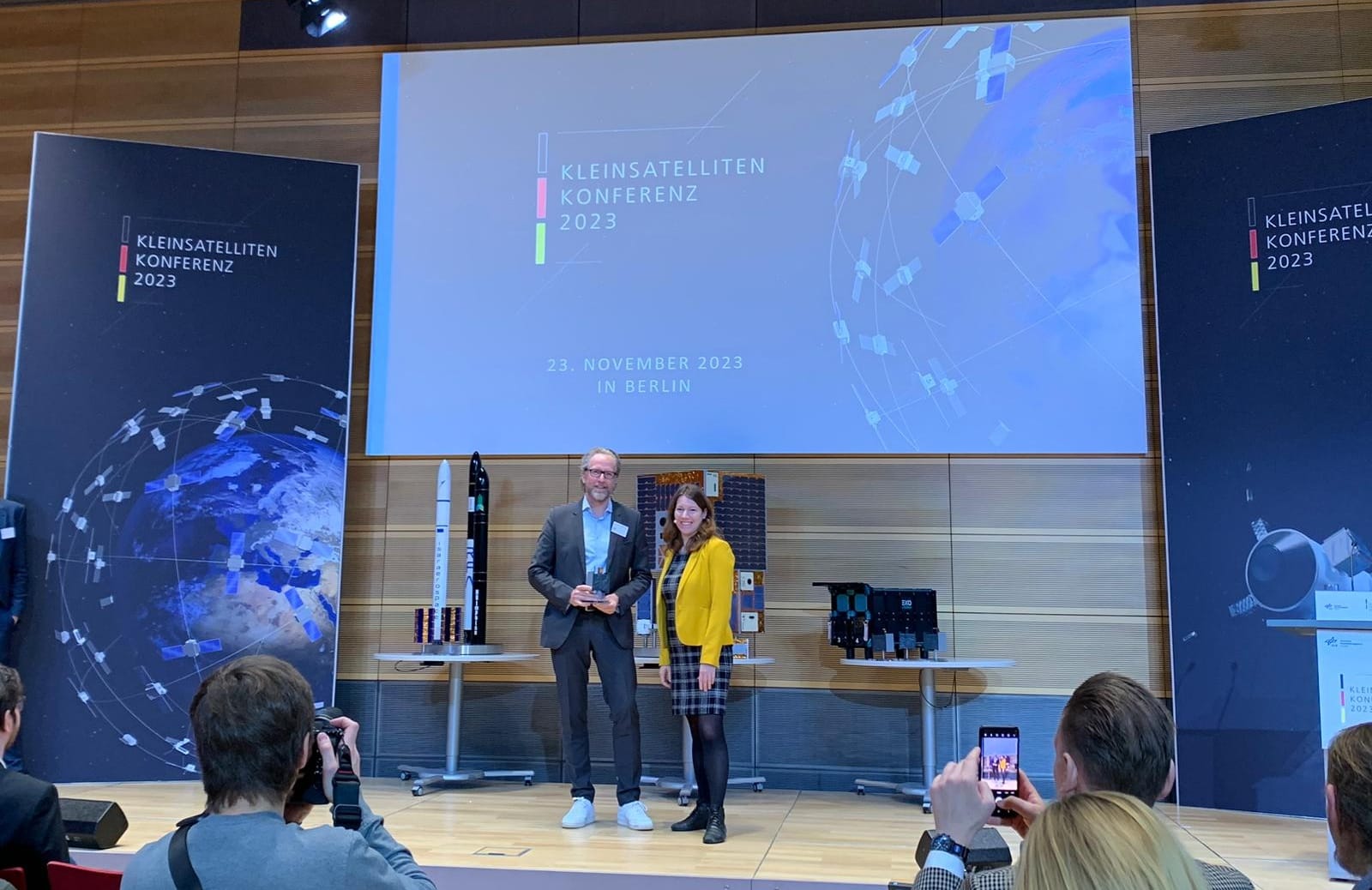
ESA´s “Zero Debris Charter” finalized – HPS among the first to sign
November 2023
ESA´s “Zero Debris Charter” finalized – HPS among the first to sign
Initiated by ESA´s office for “Strategy and Transformation” a considerable group of European space companies, including HPS, got together in order to jointly draft and now implement this continent´s set of rules for sustainable use of space. HPS is one of the first companies to sign the document on November 7th, 2023. Though legally non-binding, the “Zero Debris Charter” aims at putting an end to the inconsiderate and irresponsible pollution of space with tech-junk. In detail, the Charter clearly names the following targets:
- The probability of space debris generation through collisions and break-ups should remain below 1 in 1,000 per object during the entire orbital lifetime. A suitable aggregate probability threshold for constellations of satellites in the low Earth orbit region should be identified.
- Timely clearance of low Earth orbit and geostationary Earth orbit regions should be achieved with a probability of success of at least 99% after end of mission, including through external means when necessary.
- The casualty risk from re-entering objects should remain significantly lower than 1 in 10,000, striving towards zero casualty. A suitable aggregate risk threshold for constellations of satellites in the low Earth orbit region should be identified.
- Routine and transparent information sharing should be facilitated and active participation in strengthening global space traffic coordination mechanisms should be encouraged.
- Access to timely and accurate data on space objects down to a size of 5 cm or smaller in low Earth orbit and 20 cm or smaller in geostationary Earth orbit should be improved to enhance decision making capabilities for collision avoidance.*
Ernst K. Pfeiffer, CEO of HPS at the signature ceremony: “In our days now space is rapidly developing into the most important resource for the implementation of new technologies shaping our future on Earth. All efforts to preserve space from the beginning are therefore nothing less than efforts to preserve the fundamental conditions of life and its prosperity for humankind´s generations to come.”
*For more see:
*https://esoc.esa.int/zero-debris-community-update
*https://www.esa.int/Space_Safety/Clean_Space/World-first_Zero_Debris_Charter_goes_live
*https://www.esa.int/Space_Safety/Clean_Space/ESA_s_Zero_Debris_approach
*https://www.esa.int/Space_Safety/Clean_Space/The_Zero_Debris_Charter
HPS presents ADEO space deorbit-sail, the world’s only product series of its kind for the legal disposal of disused satellites
November 2023
SpaceTech Expo Bremen: HPS presents the ADEO space deorbit-sail, the world’s only product series of its kind for the legal disposal of disused satellites
Less than 36 months ago, they were regarded by many as nothing more than political empty phrases: the “Green Deal” of the EU Commission in Brussels and the “National Orbital Debris Implementation Plan” of the White House in Washington. Satellites continued to be launched into near- and far-Earth orbits with the prospect of becoming junk and endangering other missions for a quarter of a century after they finally burned up in the atmosphere. But that’s over now: With the adoption of the “Zero Debris Charter”, ESA has committed itself on November 7, 2023 to taking steps towards total avoidance of any space debris from 2030 at the latest, and even more concretely, namely already from October 2024, SpaceX, with over one hundred launches per year the world’s most important launch service, will no longer transport any payloads that are not equipped for their disposal within a maximum of 5 years after the end of mission operations. And as early as 2023, the U.S. FCC (“Federal Communications Commission”), as the supervisory authority for the allocation of radio frequencies, sentenced a satellite operator to a fine of $150,000 for prolonging the operation of his satellite with the propellant actually reserved for disposal, thus recklessly endangering all other missions in the vicinity. While the sum might make some people smile, the FCC has now put an end to all symbolism with its decision to no longer grant radio licenses to satellites without on-board technology for return (technical term: “deorbit”) within 5 years of the end of operations. Under the double threat of operation AND launch ban, practically all operators are forced to equip new satellites only with guaranteed reliable deorbit technology from now on.
This can be done with the on-board propulsion system using chemical propellants while shortening mission and profit, but even that does not work in case of satellite failure and is also comparatively expensive due to the need for constant control monitoring from the ground.
The alternative is called ADEO: from HPS (Munich and Bukarest) a space sail, self-deploying at the end of the mission, which automatically removes the satellite from space well below the specified deorbit times, is ideally suited as baseline-tech and emergency parachute. Already 36 million flight kilometers before the planned maneuver, the German specialist for orbit guidance and collision avoidance OKAPI:Orbits (Braunschweig) as a cooperation partner calculates the point for the descent without risk for other satellites. In addition, HPS partner number two, the Italian company AVIOSONIC, in constant liaison with the worldwide air traffic control stations, ensures via new ADEO-features highly accurate position conrol and spares aircrafts from hits by any satellite parts that may not have burned up.
The ADEO product family with officially attributed highest possible level of reliability (“TRL 9”) holds tailor-made solutions for all satellites from the tiny Pico- and Cube-Sat up to the 1.5 tonner and for all low-Earth orbits up to a distance of 900 kilometers from Earth. All ADEO lines are mass-produced by HPS, yet they feature adaptive design for special requirements that may arise from satellite design.
The prices of all ADEO models without exception are considerably lower than the expenditures required for deorbiting with chemically driven engines – apart from the fact that the safety of the deorbit of even these satellites – for example in the event of a system failure – can actually only be guaranteed by an ADEO system carried along as a backup.
For more detailed information on ADEO see: https://www.hps-gmbh.com/en/portfolio/adeo-angel-on-wings/
For the Sake of Safety and Sustainability in Space: OKAPI:Orbits´ AI now available as Assistance System to ADEO Deorbit Sail for Satellites
June 2023
Germany´s leading collision avoidance system reliably predicts the perfect slot for descent through tons of debris and space traffic.
When, after two, five or more years of operation, a satellite is supposed to leave its orbit and re-enter Earth, it’s a ride on the skyway to hell in two respects: first, for the satellite which is destined to burn up in the atmosphere, but also for other satellites as well as for an encounter with scrap parts that could hit it like unguided missiles – and produce even more junk. Satellites equipped with the ADEO braking sail from HPS are already in automatic descent mode. From now on, however, this can be upgraded by the Collision Avoidance system from industry-leading German startup OKAPI:Orbits. The company emerged as a spinoff from Braunschweig University of Technology in 2018 after over 40 years of intensive research. This Collision Avoidance System minimizes the collision risk during the de-orbit trajectory by figuring out the situation even ten days in advance. Appropriate maneuvers are also recommended for the satellite’s control system. This is made possible by the unique AI behind OKAPI:Orbits.
“Picture a distant view of 6.72 million kilometers of orbits on which about 10,000 satellites, 1,000,000 large and medium objects and 130,000,000 small ones exist that are not currently trackable. This is how complex computing operations is. Now, we should also take into account their velocity of 20,000 to 30,000 kilometers per hour. To any human sensibility, this is pure chaos, which the artificial intelligence behind our Collision Avoidance Software handles with aplomb,” says OKAPI’s company CEO Kristina Nikolaus.
Ernst K. Pfeiffer, CEO of HPS, a medium-sized innovation company, adds, “Our ADEO braking system not only performs the fastest possible passive descent even under adverse conditions – for example, when the satellite is already dead – it is also the deorbit solution with the largest safety reserve directly on board. Customers who don’t want to rely solely on their own software to control their satellites will find a unique safety architecture for the deorbit of almost all satellites with ADEO’s optional assistance systems for position tracking (Aviosonic) and optimal descent prediction (OKAPI:Orbits) at HPS.” ADEO is under discussion as a deorbit subsystem for the satellites of Europe’s coming constellation IRIS2 and “together with the features of Aviosonic and OKAPI:Orbits it levers the constellation to the most secure and sustainable one also after satellites’ nominal lifetime.”
During descent, the combination of all three technologies onboard the satellites will increase significantly the orbit determination and prediction, which is a unique advantage also for other satellites, constellations and stakeholders like owners, operators, and insurers.

HPS Joins Net Zero Space Initiative to Drive Sustainable Space-Tech Innovation
June 2023
HPS Joins Net Zero Space Initiative to Drive Sustainable Space-Tech Innovation
[Munich-Bucharest-Paris, June 12th, 2023] – HPS GmbH, a leading technology company specializing in cutting-edge solutions, is pleased to announce its membership in the Net Zero Space Initiative, an ambitious global movement dedicated to supporting sustainable practices and innovations in space.
The Net Zero Space Initiative brings together industry leaders, organizations, and experts from various sectors to collaborate on finding concrete solutions to combat space debris, thus preserving not only the economic and scientific benefits of outer space, but also its strategic potential in addressing urgent challenges such as climate change. By joining this esteemed network, HPS reaffirms its commitment to environmental stewardship and especially to a sustainable development of space infrastructures.
As a member of the Zero Space Initiative, HPS GmbH will actively contribute to the collective efforts aimed at developing sustainable technologies and practices across its operations. The company will leverage its expertise and its political as well as its industrial network to drive transformative change.
HPS drives advanced technology solutions like the world market leading deployable deorbit sail “ADEO” which enables quick decay of satellites until re-entry, reducing the risk of in-orbit collisions. By joining the Net Zero Space Initiative, the company aims to accelerate these efforts, collaborating with like-minded partners and leveraging collective knowledge to drive greater impact.
“We feel that as a part of the Net Zero Space Initiative we are with the right people,” said Dr. Ernst K. Pfeiffer, CEO of HPS. “At HPS, we believe that sustainability is both, a responsibility and an opportunity for innovation.
By collaborating with the Net Zero Space Initiative, we can amplify our efforts in developing and implementing sustainable solutions, contributing to a “greener” future in space and for our planet.”
As an advocate for sustainability, HPS GmbH Germany, as well as its affiliate HPS S.R.L. Romania, remain committed to driving positive change through its products, services, and operations. The company’s membership in the Net Zero Space Initiative represents a significant milestone in its sustainability journey.

HPS is Prepared to Provide ADEO Special Stealth Sail Edition for Europe´s IRIS2 Constellation Satellites
May 2023
HPS is Prepared to Provide ADEO Special Stealth Sail Edition for Europe´s IRIS² Constellation Satellites
The ever-growing number of satellites orbiting Earth presents a significant challenge in terms of space debris management. As space agencies and private companies deploy increasing numbers of satellites, finding effective and sustainable solutions for their safe disposal has become paramount. In this regard, the ADEO Deorbit Sail, developed by HPS offers a groundbreaking technology that enables controlled and efficient satellite deorbiting for mitigating space debris and ensuring long-term sustainability in space. By harnessing the natural forces present in space, such as solar radiation pressure and atmospheric drag, the sail facilitates controlled reentry of satellites into Earth’s atmosphere at the end of their operational life.
ADEO has already reached ESA´s hightest level of maturity, TRL 9 and proven its reliability on a number of spaceflights; getting ready to serve Europe´s new constellation IRIS2 its NewSpace-team at HPS, Munich, take it even one step further and introduce the ADEO special “stealth” sail edition. While irritating reflections and view blocking effects of conventional constellations like Starlink cause a permanent nuisance to other users of space like astronomers during flight and deorbit, the constructors of Europe´s constellation IRIS2 are going can count on to receive from HPS an exclusive offer for a special version: the ADEO Stealth Sail –invisible, fully transparent and also available for most satellite types and operational orbits.
As HPS-CEO Ernst K. Pfeiffer explains: “Our ADEO deorbit system already presents numerous benefits and applications in satellite end-of-life management like cost- & mass-effective and sustainable deorbiting, compliance with current and future Space Debris Mitigation Guidelines, flexibility and adaptability. Now, with the special stealth version for dedicated to the architects of Europe´s IRIS2 constellation we take the decisive step to let Europe set yet another standard in space sustainability”.
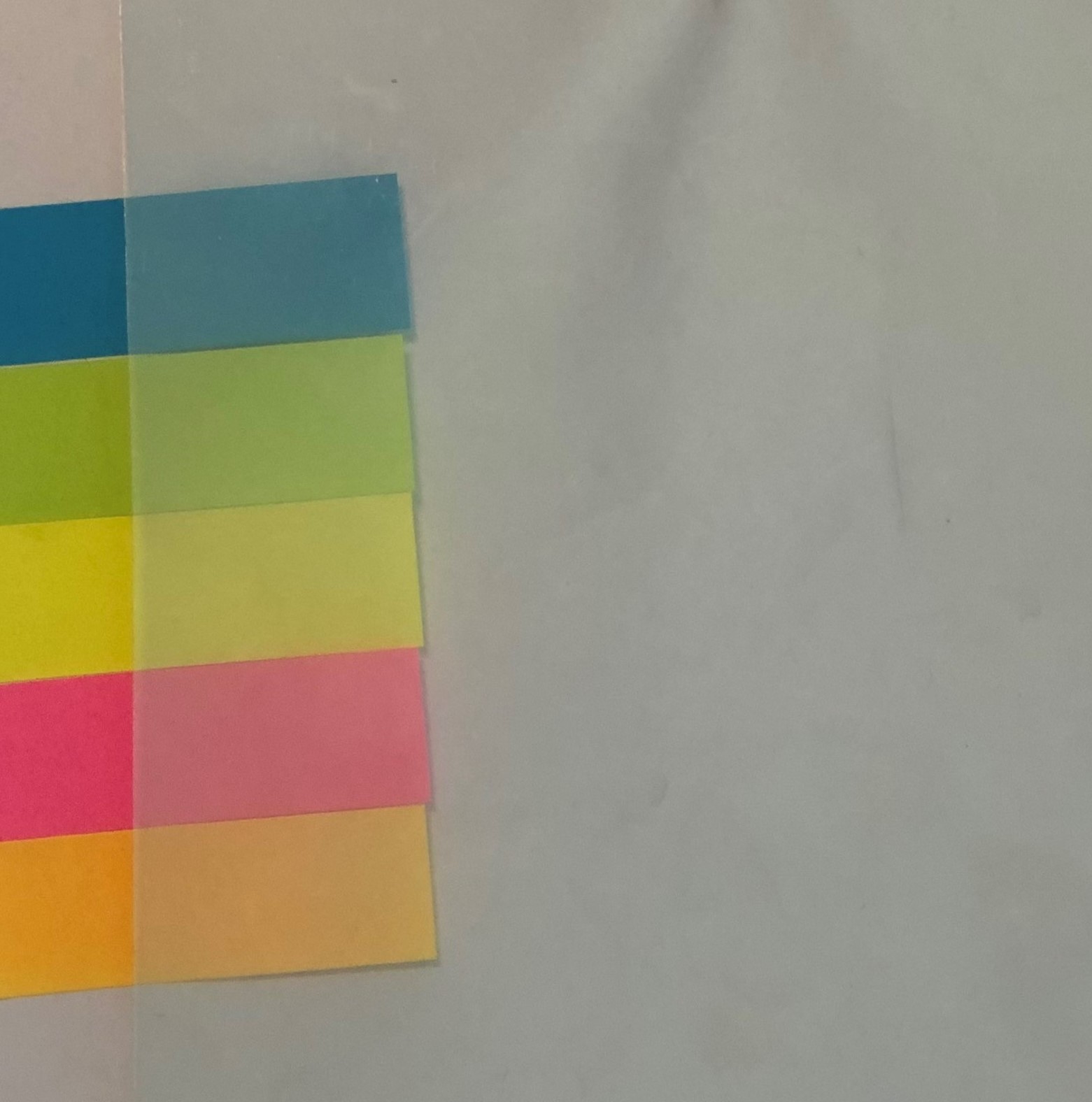
3 – 2 – 1 – Next liftoff for the HPS space sail ADEO-N3 on the satellite carrier ION of the Italian mission provider D-ORBIT
January 2023
3 – 2 – 1 – Next liftoff for the HPS space sail ADEO-N3 on the satellite carrier ION of the Italian mission provider D-ORBIT
Already in the heat of last summer, HPS in Munich was preparing for the third mission of the innovative space brake sail ADEO-N, which unfolds automatically at the end of the mission and drives “its” satellite into the atmosphere to burn up. This technology avoids the formation of new space debris already on the ground and finally makes space missions sustainable.
The ION Satellite Carrier with ADEO-N3 with its sail area of 5sqm has been on board a Falcon 9 since the picture book start on January, 31, 2023 from spaceport Vandenberg, California, now on the way to the target orbit at 270 to 500 km altitude at 53 degrees inclination. Probably by the end of 2023 ADEO-N3 will then, as on previous flights – including one with ION also on Falcon 9 – deploy the braking parachute and remove its ION Satellite Carrier from orbit without leaving any residue many times faster than usual. With the flight heritage accumulated by then, the mature ADEO system heralds a “green” space age. Because at least for European missions or missions from Europe, there will – in all probability – no longer be any more launches without deorbit tech on board: The Green Deal of the EU will then also apply to “clean-green missions” in space.
On the current flight, ADEO-N3 acts as another verification of maturity for HPS. D-Orbit and HPS already captured what will happen high above the earth during a nominal mission as historical testimony on video during the last flight:
https://www.linkedin.com/feed/update/urn:li:activity:7021106640993021952
Video is free for publication
The attached video, recorded directly on site with the on-board camera of the ION satellite of the Italian cooperation partner D-Orbit, provides live proof: with the product of HPS, which is now ready for series production after twelve years of development with great support from ESA, DLR and the Bavarian government, a new era of responsibility in space is beginning. ADEO is manufactured in series by HPS at its sites in Munich and Bucharest, primarily for constellation satellites. ADEO products are available for satellites weighing up to 2,500 kilograms at flight altitudes of up to 800 km. Even higher-flying satellites can be operated with ADEO if they have previously lowered their orbit accordingly using their own propulsion. HPS CEO Ernst K. Pfeiffer: “With ADEO on board, satellites do not become space junk in the first place. And at conditions that are ALWAYS more economical than all other options.”

